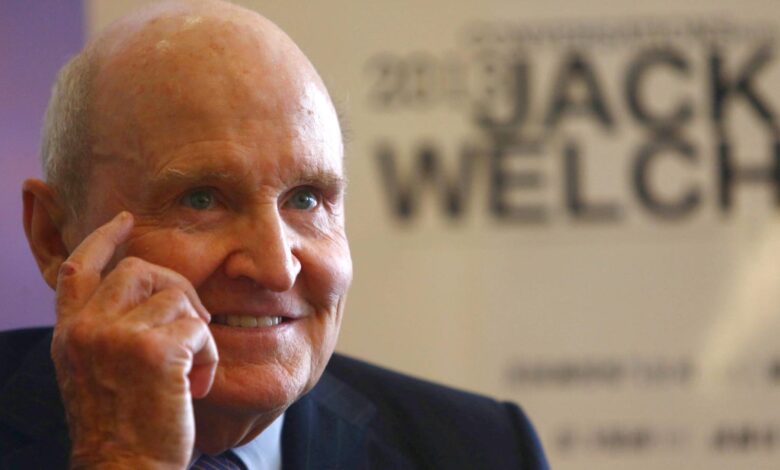Jack Welch’s Blunt Advice About Leadership Presentation Skills

CHENGDU, CHINA – Jack Welch, former chief executive officer of General Electric Co is pictured on … More
Jack Welch admired leaders who had exceptional presentation skills—and he rewarded them for it.
“You’re going nowhere at GE if you can’t do a great presentation,” Welch bluntly told his speechwriter.
Welch, the former CEO of GE, passed away on Sunday at age 84. In his twenty years as chief executive at GE, Welch didn’t just streamline operations; he decluttered executive presentations.
“Insecure managers create complexity. Real leaders don’t clutter,” Welch wrote in his autobiography.
In Welch’s bestselling book, Jack: Straight from the Gut, he wrote that clutter and jargon had no place in an executive meeting.
In one story, we get a glimpse of Welch’s no-nonsense style.
“Let’s pretend we’re in high school. Take me through the basics,” Welch asked one executive when he was trying to learn more about GE’s businesses. “For example, what’s the difference between facultative and treaty insurance?”
After fumbling through an answer for several minutes, the exasperated executive responded: “How do you expect me to teach you in five minutes what has taken me twenty-five years to learn?”
“Needless to say, he didn’t last long,” Welch added.
That incident happened nearly forty years ago, but on any given day a version of it continues to play out in business meetings around the world. A CEO wants information that’s simple, clear, and concise. Instead, they’re forced to watch presentations that are confusing, convoluted and way too long.
Although Welch was considered the right leader at the right time to invigorate GE in the early 1980s, there aren’t too many CEOs today who follow Welch’s famous strategy of firing the bottom 10% of performers every year. But the modern CEO still puts a premium on employees who can simplify complexity.
Jack Welch’s speechwriter, Bill Lane, wrote a book about this time at GE. Welch told Lane that executives who couldn’t deliver a great business presentation were at risk of falling behind. Those who did deliver great presentations stood out.
Lane tells the story of a manufacturing manager who was not known for his communication skills. But there he was, on the list of managers who had to present at an annual meeting. His slides were “appalling, unreadable, and bafflingly complex.” Lane worked with the manager to simplify the presentation.
Shortly after the presentation, the manager was elevated to corporate vice president, an exceptionally difficult title to get during Welch’s tenure. Out of 300,000 employees, only 130 were vice presidents. The manager was later told that he got the promotion because his presentation skills caught the attention of the company’s senior leaders.
In my most recent books, I include examples of young professionals and aspiring leaders who leapfrog their peers because they have better presentation skills. Numerous surveys of recruiters and HR professionals show that strong communicators have a competitive edge. They are more likely to get hired and promoted. In short, they get noticed.
Although some of the management strategies that Jack Welch implemented at GE have fallen out of favor, his observation about presentation skills were spot on and more relevant than ever.
Source link




